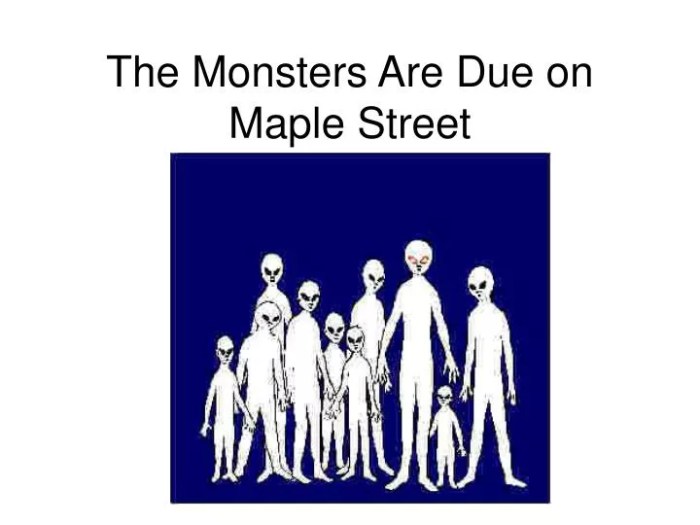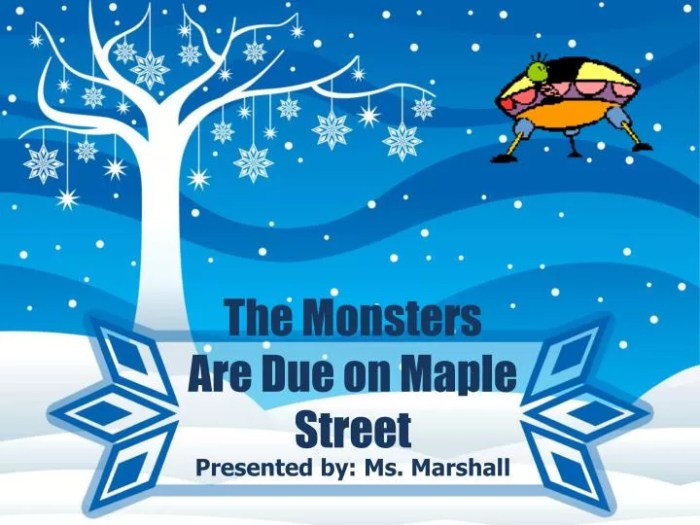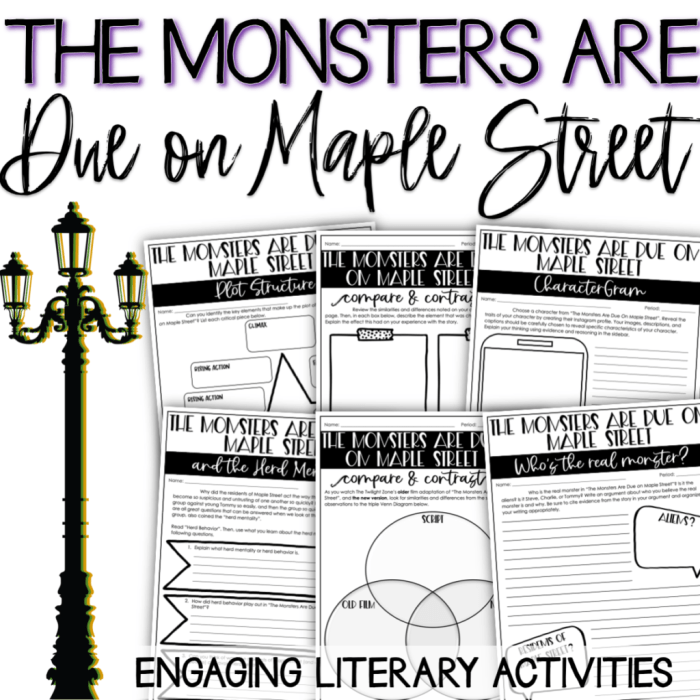The monsters are due on maple street theme – In the realm of classic television, few episodes have captured the zeitgeist and left an enduring legacy like “The Monsters Are Due on Maple Street,” an iconic installment of The Twilight Zone. This thought-provoking allegory explores the corrosive effects of fear, prejudice, and the dangers of mass hysteria, offering a timeless cautionary tale that continues to resonate in contemporary society.
Set against the backdrop of the Cold War and the McCarthy era, the episode unfolds in the seemingly idyllic Maple Street, where the arrival of mysterious strangers sows seeds of suspicion and paranoia among the residents. As fear grips the community, neighbor turns against neighbor, and the bonds of trust are shattered.
Historical Context

The episode “The Monsters Are Due on Maple Street” was released in 1960, during a period of heightened social and political tensions in the United States. The Cold War was at its peak, and the fear of communism and nuclear war was widespread.
McCarthyism, the practice of accusing people of being communists without evidence, was rampant, creating a climate of suspicion and distrust.
Character Analysis
Character Table
| Character | Role | Character Arc |
|---|---|---|
| Steve Brand | Rational and skeptical neighbor | Initially trusts the alien invasion theory, but gradually becomes suspicious of his neighbors |
| Charlie Farnsworth | Fearful and gullible neighbor | Becomes convinced that his neighbors are aliens and leads the mob against them |
| Don Martin | Authoritarian and suspicious neighbor | Uses the invasion as an excuse to take control of the neighborhood |
| Tommy | Young and innocent neighbor | Initially excited by the invasion, but becomes disillusioned and realizes the danger of the mob |
Symbolism and Allegory
Alien Invasion
The alien invasion in the episode symbolizes the fear of the unknown and the danger of prejudice. The neighbors’ quick assumption that their neighbors are aliens, without any evidence, reflects the fear and suspicion that was prevalent during the McCarthy era.
Mob Mentality
The mob that forms in the episode represents the dangers of mob mentality. The neighbors, driven by fear and suspicion, turn against each other, even those they once trusted.
Themes and Social Commentary

Main Themes
- Mob mentality and the dangers of prejudice
- The power of fear to destroy relationships and communities
- The importance of critical thinking and skepticism
Cinematography and Visual Storytelling: The Monsters Are Due On Maple Street Theme

Camera Angles
The episode uses low camera angles to create a sense of unease and vulnerability, making the neighbors seem smaller and more vulnerable to the mob.
Lighting
The use of shadows and darkness creates a sense of mystery and danger, highlighting the paranoia and suspicion among the neighbors.
Editing, The monsters are due on maple street theme
The quick cuts and jumpy editing create a sense of urgency and chaos, reflecting the rapidly deteriorating situation on Maple Street.
Cultural Impact and Legacy

The episode “The Monsters Are Due on Maple Street” has had a lasting impact on popular culture and society. It has been referenced and parodied in numerous other works, including “The Simpsons” and “Stranger Things.” The episode’s themes of mob mentality and the dangers of prejudice continue to resonate in contemporary society, as evidenced by the rise of social media and the spread of misinformation.
Questions and Answers
What is the central theme of “The Monsters Are Due on Maple Street”?
The central theme is the corrosive effects of fear and prejudice, which can lead to mass hysteria and the breakdown of social order.
How does the episode reflect the social and political climate of its time?
The episode’s themes of fear, suspicion, and paranoia were heavily influenced by the Cold War and McCarthyism, which created an atmosphere of fear and distrust in American society.
What is the significance of the “monsters” in the episode?
The “monsters” are a metaphor for the fear and prejudice that can transform ordinary people into monsters, turning them against their neighbors and destroying their community.